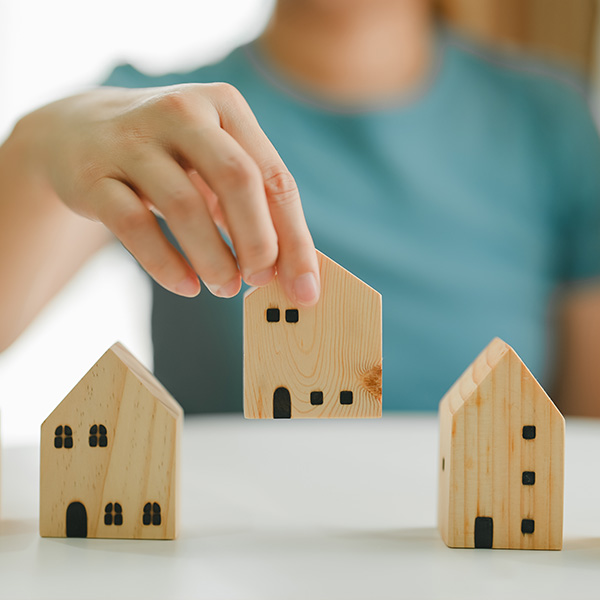What's the difference between leasehold, freehold and commonhold?
Leasehold, freehold and commonhold are different ways you can own a home. They each come with their own rules, advantages and disadvantages.
If you’re shopping around for your first home, you’ve likely run into at least two types of property ownership: leasehold and freehold. You might have also heard of a third one, the commonhold, which the new government recently mentioned in its manifesto.
It can be confusing but don't panic! We're going to break down how these different types of homeownership work and how they compare so you understand what you're committing to if you decide to buy a property.
What is a leasehold?
A leasehold is when you own a property, but not the land it sits on or, if it's a flat, the building it’s in. Leaseholds are most common with flats.
When you buy the property, it comes with the current lease which is permission to live on that land for a period of time.
As you're basically renting the ground that your property is on, you may have to pay "ground rent" to whoever the owns the land. It's worth asking how much this is before making an offer on a leasehold property.
How does a leasehold work?
With a leasehold, you pay ground rent to whoever owns the building and the land your property is on (the freeholder). They’ll be responsible for the maintenance of the building.
One of the advantages of owning a leasehold property is that you’re only responsible for the upkeep of your flat. For example, if something breaks in a communal area of the building, it’s not your responsibility to have it fixed.
But because you don’t own the building you could be limited on what changes you can make to your home. It's likely you won’t be able to change the structure of your flat without permission, but you’ll still be able to paint the walls and put up shelves wherever and whenever you like. The lease might also have rules such as no pets.
Leaseholds are usually long term, over 100 years, but can up to 999 years. During this time, the leasehold can be extended but this can be expensive especially if there are not many years left on the lease.
Properties with only a short time left on the lease can sell for a lot less than others - it's best not let a lease go down to less than 80 years as this will make a property difficult to sell and the lease will be expensive to extend.
What are the advantages and disadvantages of owning a leasehold property?
| Leasehold | |
|---|---|
| Advantages |
Disadvantages |
|
|
| Leasehold | |
|---|---|
| Advantages |
|
| Disadvantages |
|
What is a freehold?
A freehold is ownership of the land the property sits on. Freeholds are most common with houses.
You can also own property as a share of freehold, which is more common with house that have been converted into two or three flats. This is where two or more property owners own the freehold between them and generally share costs.
How does a freehold work?
Unlike a leasehold, there is usually no time limit on how long you own the land for, so you don’t have to worry about your lease running out. When you buy the property, you buy the land it sits on too.
This gives you more freedom to make changes although of course you may still need to consider planning permission.
How does a share of freehold work and how does it compare to a leasehold?
A share of freehold is an alternative to the leasehold, and mostly applies to small blocks of flats such as converted houses.
As the name suggests, you share the ownership of the land and any communal areas.
Although this means you won't need to pay ground rent, some people choose to instead put money into a shared sinking fund (a fund to be used for emergency repairs) so it's worth checking if this is the case before making an offer. You'll also need to share costs like building insurance and maintenance to communal areas.
What are the advantages and disadvantages of owning a freehold property?
| Freehold or share of freehold | |
|---|---|
| Advantages |
Disadvantages |
|
|
| Freehold or share of freehold | |
|---|---|
| Advantages |
|
| Disadvantages |
|
What is a commonhold?
Ironically, the commonhold is the least common type of property ownership in the UK. It’s mostly relevant to flats.
With a commonhold, you own the freehold of your flat, but you don't own a share of the building your flat is in or the land it sits on.
Instead, you become a member of the commonhold association, which owns the building.
How does a commonhold work?
The commonhold is an alternative to a long-term leasehold, though it comes with many of the freedoms of a freehold or share of freehold.
With a commonhold, you don’t have to worry about your lease expiring, and you also don't have to pay ground rent.
Instead, you, along with the other freeholders of your building, can take part in running a commonhold association. This association owns both the building and the land, and is responsible for managing and maintaining them.
Anyone who owns a freehold in the building can join the commonhold association.
A building can be made into a commonhold from the moment it's built, but you can also register an existing freehold building as a commonhold.
| Commonhold | |
|---|---|
| Advantages |
Disadvantages |
|
|
| Freehold or share of freehold | |
|---|---|
| Advantages |
|
| Disadvantages |
|
How can I buy my first home faster?
If you’re currently shopping around for your first home, chances are you’ve already started saving for a deposit.
But did you know that, just by changing what type of account you’re putting your money in, you could get some extra money from the government for your deposit?
Lifetime ISAs are tax-exempt savings or investment accounts designed to help you save for a first home or for life after 60. You can put up to £4,000 each tax year into a lifetime ISA, and you’ll get a 25% government bonus on everything you pay in.
This means that you could get up to an extra £1,000 each tax year to help you buy your first home faster!
The catch is that you have to use the money in your lifetime ISA to buy your first home, or wait until you’re 60 to withdraw it. Otherwise, you’ll be charged a 25% government penalty fee on the total amount you take out - this adds up to more than the government bonus you earned on that money, so you’ll end up losing some of the money you paid in yourself.

OneFamily Lifetime ISA
Ready to start saving for your first home?
Our lifetime ISA could help! You'll gain a 25% boost from the government on top of your savings, as well as any potential stocks and shares returns.
OneFamily's Lifetime ISA invests in stocks and shares. This means your money has good potential to grow over the long-term, but the value of your investments could go down as well as up and you could get back less money than you've put in if you withdraw at a time when the value is lower.

More about the different types of property ownership
You may also be interested in:
Financial inclusion – simple products and education
Complex products, high minimum monthly payments and high opening balances aren't designed for smaller savers. How can we be more inclusive?
How we’re helping disabled teens access their child trust funds
We're campaigning for teens with limited mental capacity to be able to access the money in their child trust funds more easily.
Best places to live and work in the UK
Discover the UK's best places to live and work based on quality-of-life factors including value for money and work opportunities.
Cheapest places to live in the UK
Looking to buy your first home but don’t think you can afford it? There may be somewhere cheaper for you just around the corner!
